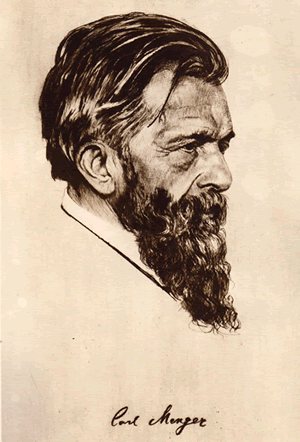A fundamental law of economics is: People pursue goals, and it doesn't matter why they do so.
People act, operate, and exchange because they continually assess things differently and possess varying knowledge about the means to achieve their goals. Individuals make decisions independently, either in isolation (autistically) or with exchange partners (interpersonally). They make their own decisions every second, and with each decision, they exchange alternatives to improve their current situation in the short or long term, satisfying needs (preferences) and eliminating uncertainties. [2] These motivations are not predictable using natural scientific methods. It is the belief of socialists that human action can be considered predictable to control the distribution problem of resources in a communal economy partially or completely. However, this is pure utopia, as the distribution problem always failed in reality and is unfeasible for purely logical reasons, as explained by the proponents of the Vienna School of Economics in many writings based on the logic of action. Humans are not predictable; this conclusion is reached by Murray Rothbard, who argues that people learn independently of knowledge. Rothbard derives this from Ludwig von Mises' later work "Theory And History": [1, 3]
While we can "examine atoms and stones, chart their movements, record their paths, and predict them," this is not the case with people because "people learn every day, adopt new values and goals, change their minds [adapting to their circumstances]; people cannot be determined and predicted like objects without understanding and without the ability to learn and choose." [3] (own translation)
According to the economist Adam Smith and his theory of objective exchange, people supposedly possess an inherent, instinctive "propensity to barter," which is said to be part of human nature. Furthermore, it is claimed that people feel an aimless inner inclination to engage in exchange. [2] It is essential to note the following: This theory is unsatisfactory in the sense that Smith asserts that every exchange of people would almost end after the first exchange act. Moreover, claiming that one can act without purpose constitutes a logical contradiction because someone who acts aimlessly aims to act aimlessly. People always pursue goals; they cannot do otherwise. This is an a priori fact that cannot be logically denied. [2]
Carl Menger, the founding father of the Austrian School of Economics, explains in his work "Principles of Economics" that the non-equivalence of goods exchange is based on the differing valuations of two exchange partners for the same good. Exchange is not an end in itself; it is limited and depends on the specific needs of the exchange partners. The principle of economic activities is that people engage in wealth transfers because they are seeking the maximum satisfaction of their preferences. Menger also elaborates on what Smith means by the propensity to barter and why people experience joy in exchanging. The exchange of goods leads to an increase in value for the exchange partners, resulting in an increase in prosperity for them. [5]
"The pleasure that people experience in the economic exchange of goods is that general feeling of joy that people feel whenever, through any event, better provision is made for the satisfaction of their needs than would have been the case without its occurrence." [5]
Another view by Adam Smith is equally misleading because he sees people as entirely equal, and it is only specialization that leads to division of labor. Ludwig von Mises, the most well-known representative of the Austrian School of Economics, has described the evolution of society in his magnum opus "Human Action," thus contradicting Smith. Mises elaborated on two crucial factors of human cooperation in the division of labor:
- The existence of differences among people. They are not equally intelligent, adaptable, or skilled, and there are inequalities in the geographical distribution of natural production factors; and [2, 6]
- The realization that labor performed in a specialized manner leads to greater productivity. [6]
Mises, quote:
"When and insofar as labor in division of labor is more productive than isolated labor, and when and insofar as man is capable of recognizing this fact, human action tends toward cooperation and association. Man becomes a social being not by sacrificing his concerns to the cause of a mythical society, but by aiming to improve his own well-being. Experience teaches that this condition - higher productivity achieved through the division of labor - exists because its cause - the natural inequality of men and the unequal geographical distribution of natural production factors - is real. Thus, we are able to comprehend the course of social evolution." [6] (own translation)
"Specialization does not lead to division of labor; rather, it is the individual decisions of people to utilize their resources and abilities more efficiently. Division of labor is not initially planned. The increased output of their own production arises from the division of labor among people because they realize it enhances productivity and thereby benefits both sides."
Economist David Ricardo was the first to realize the concept of comparative advantage. This well-known concept in economic theory states that trade between two trading partners becomes beneficial as long as their goods can be produced at different costs. However, Ricardo applied his theory to entire nations, promoting prosperity through international division of labor and trade. [4]
It was the Austrian School of Economics that provided the explanation for why, on the personal exchange level, it is not the absolute cost advantages (meaning that a specific production method can reduce the costs of producing a certain good compared to other production methods or locations) that are crucial, but rather the opportunity costs and thus complete Ricardo's comparative advantage. [4]
Opportunity costs are the costs incurred when one chooses a specific action, thus missing out on the opportunity to perform another action. This concept ties together everything that Menger and von Mises describe: Individual preferences, abilities, knowledge, and valuations of goods all play a significant role in how people decide to act, weighing which good they are willing or must give up or retain to produce or consume a bit more or less. [2, 4]
For an in-depth example, consider Robinson Crusoe and Friday, as elaborated in Rahim Taghizadegan's "Understanding Economics: An Introduction to the Austrian School of Economics": [2]
Robinson Crusoe stranded on an island a long time ago and has since become a highly specialized fisherman. But one day, he encounters Friday, who recently washed ashore on the other side of the island and has specialized in climbing coconut trees. Now, Robinson meets Friday, and they both realize that each excels in a specific skill. Friday, capable of picking 10 coconuts a day, can catch only 4 fish in the same time. In contrast, Robinson can catch 10 fish but only picks 4 coconuts a day. If they both work half a day fishing and half a day gathering coconuts for themselves, Robinson ends up with 5 fish and 2 coconuts, while Friday has 2 fish and 5 coconuts. This results in 7 fish and 7 coconuts, totaling 14 "produced" goods. However, if each focuses on their specialization, the island produces 10 coconuts and 10 fish in a day, totaling 20 "produced" goods.
Out of compassion, a trade can potentially disadvantage one of the trading partners. Suppose Robinson has a technical advantage over Friday due to knowledge from before their time on the island. Robinson can now improve in both fishing and coconut gathering, allowing him to either "produce" 10 fish or 10 coconuts in a day OR 5 fish and 5 coconuts. As mentioned earlier, people are capable of learning, and Friday has also improved, enabling him to "produce" 4 fish or 8 coconuts in a day OR 2 fish and 4 coconuts. While the total output of Robinson with 10 fish and Friday with 8 coconuts has increased compared to the previous 7 fish and 7 coconuts, it is unknown whether this results in a net gain, at least from the perspective of the Austrian School of Economics. It's not known how large the fish and coconuts are, their weights, or the relative value of a coconut compared to a fish. This depends on the preferences of the actors, in this case, Robinson and Friday. To increase the actual net gain from the division of labor between potential trading partners, Robinson could, all else being equal, produce, for example, 9 fish instead of 10 and one additional coconut. This would make the net gain of one coconut and the foregone fish equivalent to 2 coconuts for one fish.
The ability of Robinson and Friday to learn helps them continually improve their skills and knowledge through experience, allowing them to make better decisions from their perspective, weigh less advantageous alternatives, reduce their individual opportunity costs, and, in turn, increase their productivity.
In summary, it can be said that the differences among people allow for various forms of specialization, but they do not imply division of labor. Individuals make personal decisions on how to utilize resources and skills, and they evaluate these choices differently. Based on these evaluations, they decide whether their productivity increases implicitly through the division of labor with others and the societal division of labor, in order to achieve their personal goals and increase their wealth. It is important to note that people are not entirely predictable, as they are capable of learning, and their decisions and actions can change as they weigh alternatives and make choices. All these aspects demonstrate that the economy is not predictable and linear; rather, it is shaped by the interaction of individual decisions and the resources of individuals.
--
Sources:
[1] Murray Rothbard, „Theorie und Geschichte“: Mises’ großartiges Spätwerk, in dem er die Folgen falscher Wissenschaftlichkeit für unsere Freiheit offenlegt, https://www.misesde.org/2015/11/„theorie-und-geschichte“-mises-grosartiges-spatwerk-in-dem-er-die-folgen-falscher-wissenschaftlichkeit-fur-unsere-freiheit-offenlegt/
[2] Rahim Taghizadegan, Wirtschaft wirklich verstehen: Einführung in die Österreichische Schule der Ökonomie, 2011
[3] Thorsten Polleit, Vortrag zu Mises’ Werk “Theorie und Historie”, Mises Institut Deutschland, https://www.youtube.com/watch?v=z5ybAQnuSQI
[4] lernhelfer, https://www.lernhelfer.de/schuelerlexikon/politikwirtschaft/artikel/komparative-kostenvorteile
[5] Menger, Carl, Grundsätze der Volkswirthschaftslehre, 1871 [6] Ludwig von Mises, Human Action: A Treatise on Economics, 1949





Related Posts
Czy dystrybucja Bitcoina jest sprawiedliwa?
May 02, 2024
Che cos'è l'Economia Austriaca?
Nov 24, 2023
Cos'è l'economia austriaca?
Nov 21, 2023